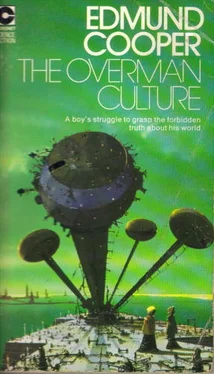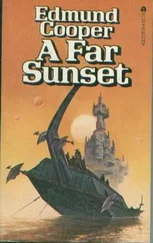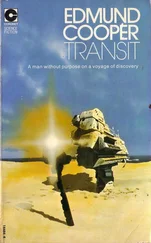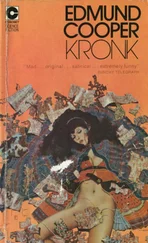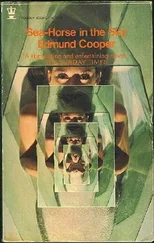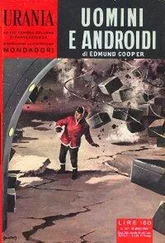Edmund Cooper - The Overman Culture
Здесь есть возможность читать онлайн «Edmund Cooper - The Overman Culture» весь текст электронной книги совершенно бесплатно (целиком полную версию без сокращений). В некоторых случаях можно слушать аудио, скачать через торрент в формате fb2 и присутствует краткое содержание. Город: London, Год выпуска: 1977, ISBN: 1977, Издательство: Coronet Books, Жанр: Фантастика и фэнтези, на английском языке. Описание произведения, (предисловие) а так же отзывы посетителей доступны на портале библиотеки ЛибКат.
- Название:The Overman Culture
- Автор:
- Издательство:Coronet Books
- Жанр:
- Год:1977
- Город:London
- ISBN:978-034017860
- Рейтинг книги:5 / 5. Голосов: 1
-
Избранное:Добавить в избранное
- Отзывы:
-
Ваша оценка:
- 100
- 1
- 2
- 3
- 4
- 5
The Overman Culture: краткое содержание, описание и аннотация
Предлагаем к чтению аннотацию, описание, краткое содержание или предисловие (зависит от того, что написал сам автор книги «The Overman Culture»). Если вы не нашли необходимую информацию о книге — напишите в комментариях, мы постараемся отыскать её.
The Overman Culture — читать онлайн бесплатно полную книгу (весь текст) целиком
Ниже представлен текст книги, разбитый по страницам. Система сохранения места последней прочитанной страницы, позволяет с удобством читать онлайн бесплатно книгу «The Overman Culture», без необходимости каждый раз заново искать на чём Вы остановились. Поставьте закладку, и сможете в любой момент перейти на страницу, на которой закончили чтение.
Интервал:
Закладка:
It was quite dark before they discovered where the road they chose had finally taken them. Ernest, though more tired than Michael and very saddle-sore, seemed to be vastly amused when he recognized the approach to Westminster Bridge.
“In our beginning is our end,” he said, almost happily. “In our end is our beginning.”
“Did you invent that?”
“No. I borrowed it from a book.”
Michael was suddenly struck by a thought. “We can’t keep the bicycles. Why don’t we put them back where we found them, at the Odeon? If the drybones ever find out what we have done, we can claim that there was no harm in it, because the bicycles were returned.”
“We may be seen.”
“A risk worth taking. After seeing no one all day I’ll be almost glad to meet a drybone.”
But, curiously, they managed to get the bicycles back to the Odeon, Leicester Square, without encountering either fragiles or drybones.
It had been an unnerving kind of day—a day in which, at times, they had felt like the only people left alive.
Before they parted, to return to their own homes, Ernest brought up once more the question of Michael’s disappearing books. He had not shown a great deal of surprise when Michael had first told him what had happened. So far he had been lucky. His books, wrapped in plastic sheet, were hidden in the shrubbery in St. James’s Park.
“I wonder how they knew where you kept them.”
“What?”
“The books.”
“I simply don’t know. Maybe they are telepathic, these alien child stealers. Or maybe there is some way of seeing into the bathroom. Or maybe one of the screws in the wretched panel fell out. Does it matter?”
Ernest put a reassuring arm on his shoulder. “I don’t think so. If they were going to do anything about it, they would have done it by now.”
“I’m going back to the library tomorrow night. Then we will know.”
“Would you like me to come?”
Michael shook his head. “It is better alone. They may not know if anyone else has taken books.”
Ernest said tangentially: “We are not on Earth, you know. Suddenly, I am sure of it.”
“What makes you so sure?”
“Mad logic. Quite mad logic. All those rows of deserted houses, this whole situation. Drybones. A river that isn’t a river. Roads that always loop back. A queen who should be dead. A war that should be over.”
It was a cold clear night. The wind had begun to blow. Michael looked up at the unchanging pattern of the stars and shivered: They, at least, were constants. He wondered if, really, the Earth were somewhere out there. He wondered if in some far reach of space, there was another London!—a real London, unimaginably crowded with people, where a river ran to the sea and where roads led to other towns and cities.
“Mad logic indeed,” he said, “but either not mad enough or else too mad to justify that extravagance.”
Ernest also was shivering—with fatigue, with coldness, with excitement. “I’ve saved the maddest bit to the last,” he said, his teeth chattering a little. “One of my books— The Concise Oxford Dictionary of English Literature. It has in it the names of more than half the fragiles we know…. Michael, I’m cold. I’m cold so that I’ll never be warm again. You know the coldness I mean?”
“I know it,” said Michael softly. “I know it.”
19
Oddly, the library was less dark than when Michael and the Family had last been there. Outside, the sky had only a few thin skeins of cloud, and most of the stars were brilliant, sharp, untwinkling. The full moon was bright with cold fire; its light strong enough to penetrate the dusty library windows, supplying a ghostly illumination to the piles of books.
Michael found the scene disturbing and enchanting. Beautiful. Like the set for a romantic film. Like a symbol of life in the midst of death. For here were the strange, world-shattering thoughts of hundreds of fragiles committed to countless bound sheets of paper.
There was something wonderful about books. Something elegant. They could preserve thoughts and ideas forever—or as long as paper would last. They were devices for allowing the human spirit to leap across time and space. They were the most marvelous, the most fascinating things in the world.
He was amused at his own mute eloquence. He had not come here to rhapsodize about books, but to find one or two that might provide more information. He looked around carefully. Nothing seemed to have been disturbed since the last time. But then it would be very difficult to tell, because the books were in such haphazard piles.
He took the torch out of his pocket—he had got a new battery for it from Father’s store cupboard— pressed the switch, and allowed the beam of artificial light to reinforce the moonlight. He became more confident that nothing had been disturbed since last time. Except that the door at the far end of the library, the one that led down to the passages, was open. Michael could not remember whether anyone had shut it when they left the library before.
He switched off the torch, reluctant to challenge the moonlight, reluctant even to disturb the stillness by moving. He wished Emily was with him. He wanted her to be with him very much. Apart from brief periods at high school and the reading lessons he gave her, usually with Jane Austen, he had not had any time alone with her for several days.
He and Emily had become very dependent upon each other. They kissed and caressed. They said foolish things that did not seem foolish at all at the time. They explored each other’s bodies and found them exciting. They discovered how each other’s secret parts could be aroused to intense feeling. Michael had found that, in the end, it was only reasonable that such secret parts should be brought together, and the intensity doubled, tripled, quadrupled until there was nothing but unthinking ecstasy.
The first time he had thus held and loved Emily was by moonlight, by summer moonlight among tall, feathery grasses. He wished that she was here now. He badly wanted to hold her and love her, here among the books with moonlight on her face, among the silent thoughts and words of all those other fragiles.
Michael began to think he was more than a little crazy. Away with thoughts of Emily. He had come for books. He switched on the torch once more and began to inspect his treasure.
The first pile he explored seemed to consist entirely of long stories: Sons and Lovers by D. H. Lawrence; For Whom the Belt Tolls by Ernest Hemingway; The Green Child by Herbert Read; Lost Horizon by James Hilton; and The Grapes of Wrath by John Steinbeck.
Michael flipped the pages of some of them, reading a paragraph here and there. His reading was good now. He could read quickly without stumbling much over the big words. There were still many words and expressions that he did not understand; but not enough to severely distort the meaning of what he read.
He found some of the fragments that he read fascinating; but at the moment he wanted something more useful than stories. One day, perhaps, there would be time for stories. But now the need was for information. Regretfully, he put the books down and turned to another pile. That, too, proved to be stories.
He wandered about, glancing at several such piles, until the torch beam shone on four books, similarly bound. The titles and the name of the author seemed to have a physical impact upon him. The books were four volumes of a history of the Second World War, and the author was Winston Churchill. The titles of the volumes were: The Gathering Storm, Their Finest Hour, The Grand Alliance and The Hinge of Fate.
Michael picked up The Gathering Storm and began to flip through the pages, snatching a subtitle and a sentence or two here and there. His excitement increased. These were the kind of books he needed—books that gave a real account of what had happened in a real world. But where could he possibly hide four such substantial books? Certainly not at home. It looked as if he would be reduced to using some hiding place similar to Ernest’s; but then he would not be able to read as frequently as he wished.
Читать дальшеИнтервал:
Закладка:
Похожие книги на «The Overman Culture»
Представляем Вашему вниманию похожие книги на «The Overman Culture» списком для выбора. Мы отобрали схожую по названию и смыслу литературу в надежде предоставить читателям больше вариантов отыскать новые, интересные, ещё непрочитанные произведения.
Обсуждение, отзывы о книге «The Overman Culture» и просто собственные мнения читателей. Оставьте ваши комментарии, напишите, что Вы думаете о произведении, его смысле или главных героях. Укажите что конкретно понравилось, а что нет, и почему Вы так считаете.
